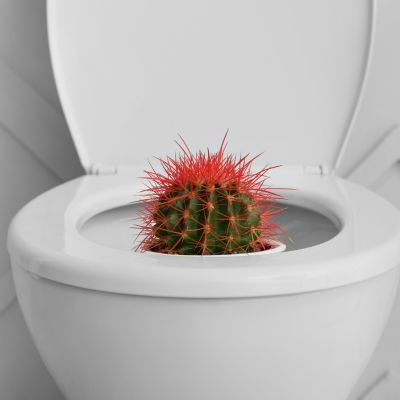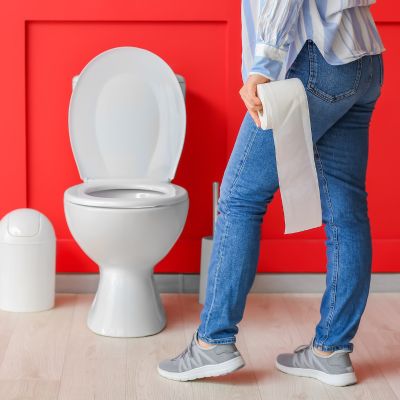Hemorrhoids can go unnoticed but they can also be an uncomfortable or even painful condition. Along with making life difficult, you may also feel embarrassed about your condition. In this blog, we look at the three different types of hemorrhoids and one complication, so that you can spot them early and get the treatment that you need.

Hemorrhoids come in three main types: internal, prolapsed, and external. Internal hemorrhoids develop inside the body and can go unnoticed until they grow larger. Prolapsed hemorrhoids are internal hemorrhoids that protrude outside of the body. External hemorrhoids develop underneath the skin. Thrombosed hemorrhoids are those that develop a blood clot and can lead to more severe complications.
Hemorrhoid Treatment in Evansville, IN
The board-certified surgeons at Evansville Surgical Associates are committed to being there for you through every step of treatment. When you visit any of our locations, you can have peace of mind knowing that you will be receiving the highest quality of care. Our surgeons train in the latest surgical advances to treat hemorrhoids, abdominal issues, and more.
To meet our surgeons, click here!
The 3 Types of Hemorrhoids
There are different types of hemorrhoids with some being visible and others going unnoticed. They become visible when they expand, often appearing as blue or red lumps.
The three types of hemorrhoids are:
- Internal hemorrhoids
- Prolapsed hemorrhoids
- External hemorrhoids
Some patients only experience one type of hemorrhoid while others experience a combination of them. Talk to your doctor about your symptoms to receive a correct diagnosis and treatment for your condition.
1. Internal Hemorrhoids
Hemorrhoids located inside the rectum are known as internal hemorrhoids. This type usually goes away on its own and poses no significant threats to your health. Most cases are painless since there aren’t any nerves to detect pain in that part of your body. This means that you may never experience symptoms of internal hemorrhoids or even know you have them.
However, they can occasionally develop into a more painful condition. If they grow, you may experience symptoms such as:
- Itching
- Burning
- Pain and discomfort
- Lumps or swelling around the anus
Internal hemorrhoids can be irritated by bowel movements. This can result in bright red blood which you will notice on your toilet paper. Contact your doctor immediately if you experience rectal bleeding. They will also be able to tell if the cause is actually anal fissures in cases of severe pain and provide you with the correct form of treatment for your condition.
Click here to learn the cause of hemorrhoids!
2. Prolapsed Hemorrhoids
Internal hemorrhoids can develop into prolapsed hemorrhoids—a condition where they appear as bumps or lumps protruding from your anus. They can be assessed on a grading scale by your doctor on a scale of one to four.
The scale for grading prolapsed hemorrhoids is as follows:
- Grade 1: no prolapsing
- Grade 2: prolapsed but can retract on their own. This occurs when you put pressure on the rectal or anal area. For example, straining during a bowel movement and then returning to a normal position.
- Grade 3: a prolapse that doesn’t return to normal on its own. These can begin to affect your daily life due to pain and swelling, as well as the risk of infection.
- Grade 4: a prolapse that doesn’t return to normal on its own and results in pain during the process. They require treatment for discomfort, pain, and other complications.
It’s possible to see these types of hemorrhoids by examining the area with a mirror. They may appear as nothing more than a protrusion in some cases. In others, on the other hand, they may be accompanied by a burning sensation, itchiness, discomfort, or pain. Surgery may become necessary to correct or remove them to prevent pain and other complications.
To learn how hemorrhoids can be treated at home and surgically, click here!

3. External Hemorrhoids
Like the previous types, external hemorrhoids are located around or on your anus. Despite being external, they’re not always visible although they can form on the surface. External hemorrhoids aren’t usually a major medical problem but they may require treatment if you experience pain or if they begin to affect your daily routine.
The symptoms of external hemorrhoids are the same as internal hemorrhoids, including:
- Itching
- Burning
- Pain and discomfort
- Lumps or swelling around the anus
Where they differ is that their location leaves you with a higher risk of experiencing discomfort or pain while:
- Sitting
- Using the bathroom
- Engaging in physical activities
External hemorrhoids are also easier to see when swollen. The bluish, swollen vein becomes visible just beneath the skin. Contact your doctor if you experience any discomfort or pain from external hemorrhoids.
And 1 Complication of Hemorrhoids: Thrombosed Hemorrhoids
A thrombosed hemorrhoid is a complication that occurs within a hemorrhoid. It is caused by a blood clot (thrombosis) developing inside the hemorrhoid tissue. They can occur within internal and external hemorrhoids, resulting in common symptoms such as:
- Inflammation
- Redness and swelling
- Severe itchiness and pain
- A bluish color around the affected area
It’s important to contact your doctor if you suspect that you have a thrombosed hemorrhoid. These types of hemorrhoids can cut off the blood supply to the tissue, eventually resulting in even more severe complications.
Do you need treatment for hemorrhoids in Evansville, IN? Contact us today to schedule your appointment!
The three main types of hemorrhoids are internal, prolapsed, and external. Internal hemorrhoids are located inside the body and may go unnoticed unless they grow larger. They can develop into prolapsed hemorrhoids that protrude outside of the body. External hemorrhoids develop underneath the skin. Any type of hemorrhoid can become a thrombosed hemorrhoid, resulting in more severe complications without treatment.
Evansville Surgical Associates has been providing comprehensive and compassionate surgical care for over 50 years. Call us at (812) 424-8231 or (800) 264-8231. We are available from 8:00 am to 4:30 pm if you would like to schedule an appointment.

